高中英语外研版(2019)选择性必修第四册Unit 2 Lessons in life-Developing ideas Reading 2 课件(共24张PPT)
文档属性
| 名称 | 高中英语外研版(2019)选择性必修第四册Unit 2 Lessons in life-Developing ideas Reading 2 课件(共24张PPT) | 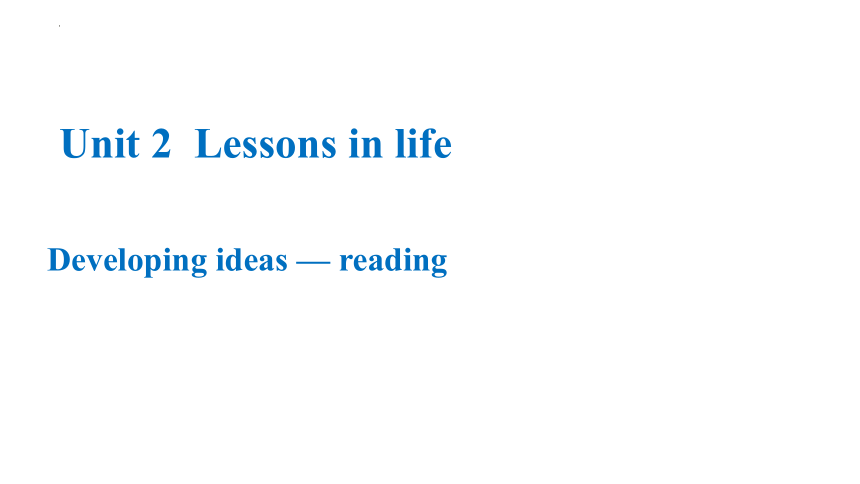 | |
| 格式 | zip | ||
| 文件大小 | 186.0KB | ||
| 资源类型 | 教案 | ||
| 版本资源 | 外研版(2019) | ||
| 科目 | 英语 | ||
| 更新时间 | 2022-08-03 09:47:34 | ||
图片预览

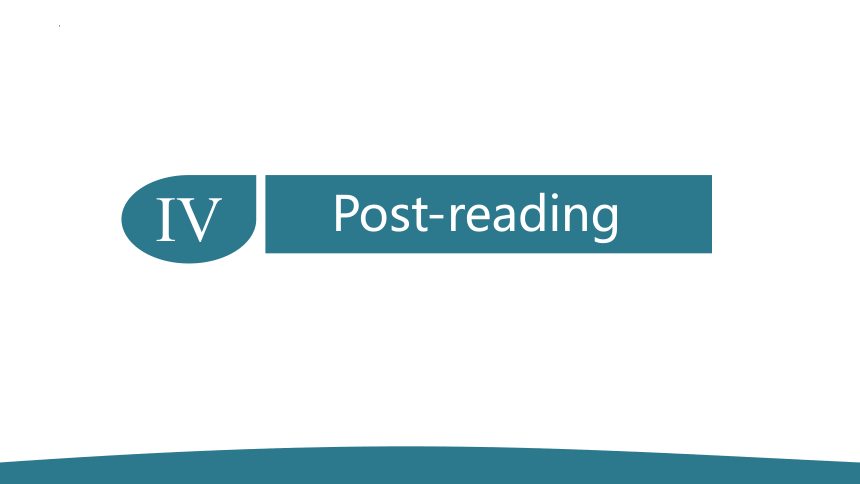
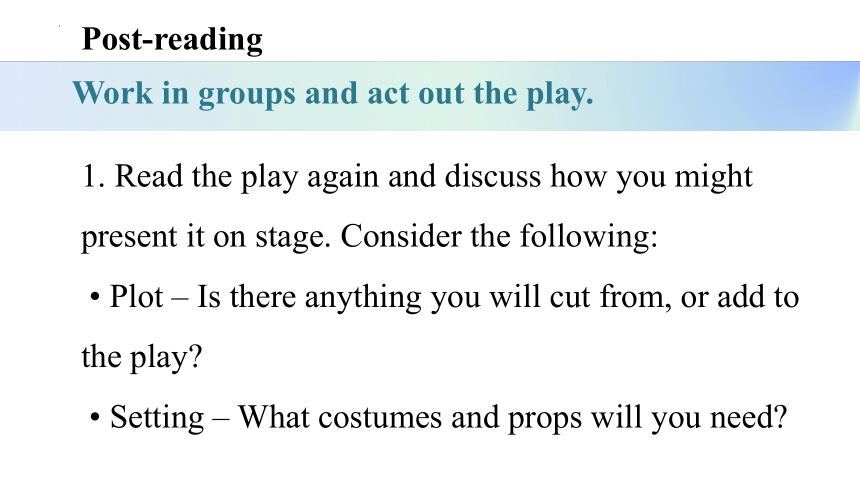
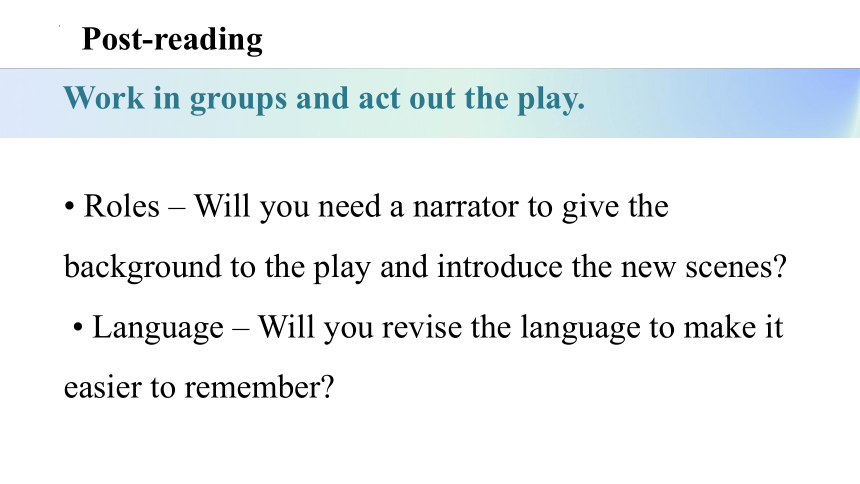
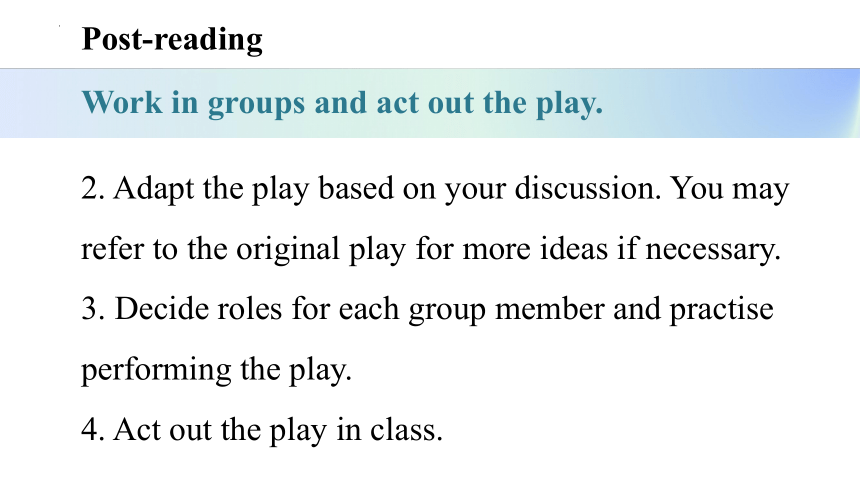
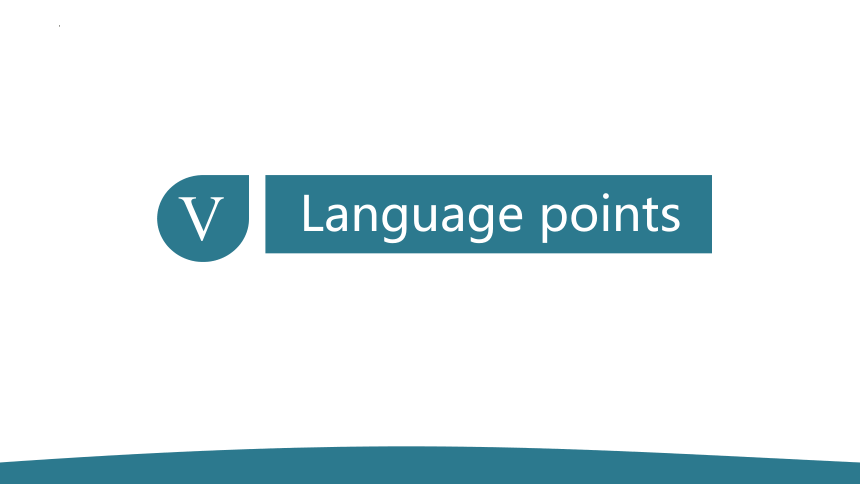
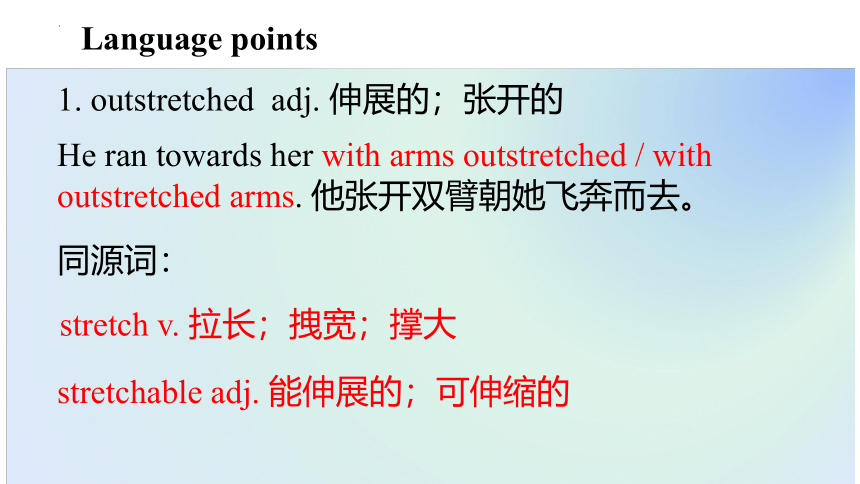
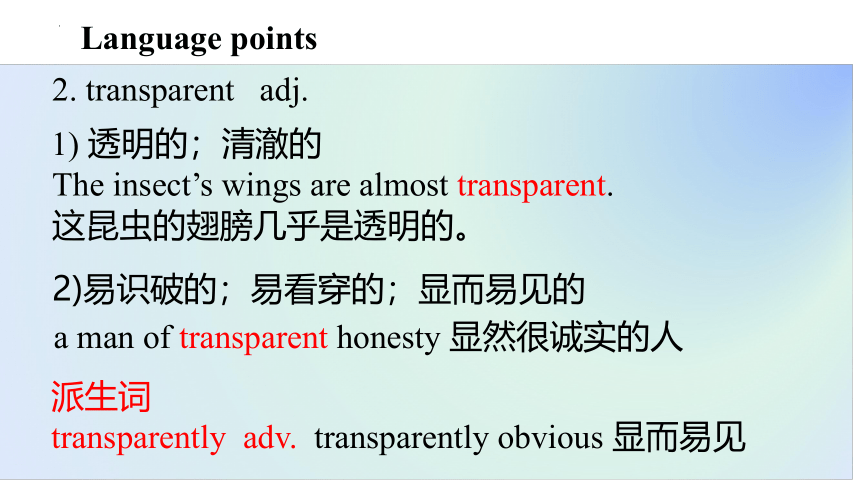
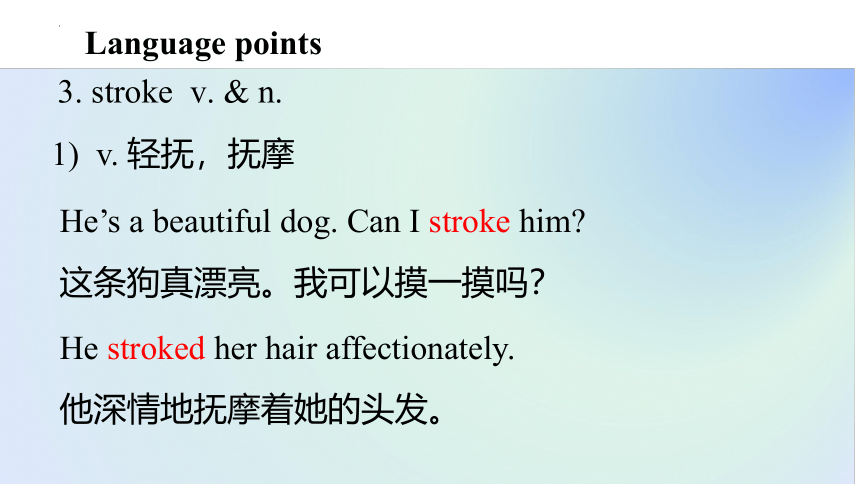
文档简介
(共24张PPT)
Developing ideas — reading
Unit 2 Lessons in life
Ⅳ
Post-reading
Post-reading
Work in groups and act out the play.
1. Read the play again and discuss how you might present it on stage. Consider the following:
Plot – Is there anything you will cut from, or add to the play
Setting – What costumes and props will you need
Post-reading
Work in groups and act out the play.
Roles – Will you need a narrator to give the background to the play and introduce the new scenes
Language – Will you revise the language to make it easier to remember
Post-reading
Work in groups and act out the play.
2. Adapt the play based on your discussion. You may refer to the original play for more ideas if necessary.
3. Decide roles for each group member and practise performing the play.
4. Act out the play in class.
Language points
V
1. outstretched adj. 伸展的;张开的
Language points
He ran towards her with arms outstretched / with outstretched arms. 他张开双臂朝她飞奔而去。
同源词:
stretch v. 拉长;拽宽;撑大
stretchable adj. 能伸展的;可伸缩的
2. transparent adj.
Language points
1) 透明的;清澈的
The insect’s wings are almost transparent.
这昆虫的翅膀几乎是透明的。
a man of transparent honesty 显然很诚实的人
派生词
transparently adv. transparently obvious 显而易见
2)易识破的;易看穿的;显而易见的
3. stroke v. & n.
Language points
1) v. 轻抚,抚摩
He’s a beautiful dog. Can I stroke him
这条狗真漂亮。我可以摸一摸吗?
He stroked her hair affectionately.
他深情地抚摩着她的头发。
3. stroke v. & n.
Language points
to have / suffer a stroke 患中风
His punishment was six strokes of the cane.
给他的惩罚是挨六教鞭。
2) n. 击球(动作);(打、击等的)一下,一击;中风
1. search for ______________
2. a troop of ______________
3. burst our laughing ______________
4. be crammed with ______________
5. be dressed in ______________
寻找
一群
Language points
突然大笑起来
塞满,填满
穿着……
6. bursts of laughter _________________
7. the majority of … _________________
9. be reluctant to do sth. _________________
10. lean on _________________
11. so … as to … _________________
Language points
哈哈大笑声
大多数……
靠在……上
不情愿做某事……
如此……以至于
1. They dance merrily around the CHILDREN, then the one who appears to be the chief goes up to TYLTYL with hand outstretched.
Language points
Paraphrase: They dance around the CHILDREN happily, then the one who seems to be the chief comes up to TYLTYL and stretches hand.
本句中 with hand outstretched 表伴随。with 后面的名词或名词短语可以接形容词、副词、现在分词或不定式等。例如:
Language points
The girl is accustomed to sleeping with the window open. 这个女孩习惯开着窗户睡觉。
I can’t do my homework with all this noise going on.
这么吵,我没法做家庭作业。
1. They dance merrily around the CHILDREN, then the one who appears to be the chief goes up to TYLTYL with hand outstretched.
2. Why, no ... I don’t remember seeing any of you
Language points
文中多次出现 why 这个词,在这里 why 并不意为常见的“为什么”,而是表示惊讶或突然意识到某事,意思是“哎呀,嘿”。例如:
Why, look who’s here!
哎呀,看看这是谁!
3. TYLTYL Then there are Happinesses in my home
THE HAPPINESS You heard him! Are there Happinesses in his home! Why, it is crammed with Happinesses!
Language points
以上对白中You heard him! 使用过去时是非常贴切、应景的。作者连用三个感叹句来表达一种强烈的感情,寓意深刻。另外以上对白中出现了陈述句式的疑问句和疑问句式的感叹句,这些在文学作品中,尤其是戏剧中比较常见。本课的戏剧剧本中,还出现了很多其他的感叹句。例如:
Language points
Why, we are the only things you do know! We are always around you! We eat, drink, wake up, breathe and live with you!
My bird! Why, he’s blue! But it’s my turtle-dove! But he’s much bluer than when I went away! Why, that’s the Blue Bird we were looking for!
She can run, she can dance, she can fly!
(with a cry of despair) He is gone!
4. If any of you should find him, would you be so very kind as to give him back to us
Language points
Paraphrase: If it might be possible for any of you to find him, would you be so kind enough as to return him to us
Language points
本句中的 should 是正式和礼貌的用法,尤其用在英式英语中。这里的 should 意为“可能”,用于表示某事可能会发生或属实。例如:
What if I should fall sick and not be able to work
万一我生病无法工作的话怎么办?
4. If any of you should find him, would you be so very kind as to give him back to us
Post-writing
The Merchant of Venice is one of Shakespeare’s plays. Bassanio, a noble but penniless Venetian, asks his friend Antonio for a loan so that Bassanio can undertake a journey to woo Portia. Antonio, whose money is invested in foreign ventures, borrows money from Shylock in order to be able to assist Bassanio.
adj. 身无分文的;贫穷的
vt. 向……求爱
Post-writing
However, if the loan cannot be repaid in time, Antonio will give Shylock a pound of flesh.
News arrives that Antonio’s ships have been lost at sea. Unable to get his money back, Shylock attempts to use justice to enforce a terrible revenge on Antonio: he demands his pound of flesh. Shylock’s revengeful
v. 强制执行
n. 报复;报仇
Post-writing
plan is foiled by Portia, who turns the tables on Shylock by an argument: he must take flesh only, and Shylock must die if any blood is spilled. Thus, the contract is cancelled. The play ends with the news that, in fact, some of Antonio’s ships have arrived safely.
转败为胜
v. 挫败;阻止
Post-writing
This play, in my opinion, focuses on several main
themes, such as the strong friendship between Bassanio and Antonio, the strength of women’s character of overcoming the restraints set by society of that time, and so on.
n. 约束;抑制
Homework
Ⅳ
Developing ideas — reading
Unit 2 Lessons in life
Ⅳ
Post-reading
Post-reading
Work in groups and act out the play.
1. Read the play again and discuss how you might present it on stage. Consider the following:
Plot – Is there anything you will cut from, or add to the play
Setting – What costumes and props will you need
Post-reading
Work in groups and act out the play.
Roles – Will you need a narrator to give the background to the play and introduce the new scenes
Language – Will you revise the language to make it easier to remember
Post-reading
Work in groups and act out the play.
2. Adapt the play based on your discussion. You may refer to the original play for more ideas if necessary.
3. Decide roles for each group member and practise performing the play.
4. Act out the play in class.
Language points
V
1. outstretched adj. 伸展的;张开的
Language points
He ran towards her with arms outstretched / with outstretched arms. 他张开双臂朝她飞奔而去。
同源词:
stretch v. 拉长;拽宽;撑大
stretchable adj. 能伸展的;可伸缩的
2. transparent adj.
Language points
1) 透明的;清澈的
The insect’s wings are almost transparent.
这昆虫的翅膀几乎是透明的。
a man of transparent honesty 显然很诚实的人
派生词
transparently adv. transparently obvious 显而易见
2)易识破的;易看穿的;显而易见的
3. stroke v. & n.
Language points
1) v. 轻抚,抚摩
He’s a beautiful dog. Can I stroke him
这条狗真漂亮。我可以摸一摸吗?
He stroked her hair affectionately.
他深情地抚摩着她的头发。
3. stroke v. & n.
Language points
to have / suffer a stroke 患中风
His punishment was six strokes of the cane.
给他的惩罚是挨六教鞭。
2) n. 击球(动作);(打、击等的)一下,一击;中风
1. search for ______________
2. a troop of ______________
3. burst our laughing ______________
4. be crammed with ______________
5. be dressed in ______________
寻找
一群
Language points
突然大笑起来
塞满,填满
穿着……
6. bursts of laughter _________________
7. the majority of … _________________
9. be reluctant to do sth. _________________
10. lean on _________________
11. so … as to … _________________
Language points
哈哈大笑声
大多数……
靠在……上
不情愿做某事……
如此……以至于
1. They dance merrily around the CHILDREN, then the one who appears to be the chief goes up to TYLTYL with hand outstretched.
Language points
Paraphrase: They dance around the CHILDREN happily, then the one who seems to be the chief comes up to TYLTYL and stretches hand.
本句中 with hand outstretched 表伴随。with 后面的名词或名词短语可以接形容词、副词、现在分词或不定式等。例如:
Language points
The girl is accustomed to sleeping with the window open. 这个女孩习惯开着窗户睡觉。
I can’t do my homework with all this noise going on.
这么吵,我没法做家庭作业。
1. They dance merrily around the CHILDREN, then the one who appears to be the chief goes up to TYLTYL with hand outstretched.
2. Why, no ... I don’t remember seeing any of you
Language points
文中多次出现 why 这个词,在这里 why 并不意为常见的“为什么”,而是表示惊讶或突然意识到某事,意思是“哎呀,嘿”。例如:
Why, look who’s here!
哎呀,看看这是谁!
3. TYLTYL Then there are Happinesses in my home
THE HAPPINESS You heard him! Are there Happinesses in his home! Why, it is crammed with Happinesses!
Language points
以上对白中You heard him! 使用过去时是非常贴切、应景的。作者连用三个感叹句来表达一种强烈的感情,寓意深刻。另外以上对白中出现了陈述句式的疑问句和疑问句式的感叹句,这些在文学作品中,尤其是戏剧中比较常见。本课的戏剧剧本中,还出现了很多其他的感叹句。例如:
Language points
Why, we are the only things you do know! We are always around you! We eat, drink, wake up, breathe and live with you!
My bird! Why, he’s blue! But it’s my turtle-dove! But he’s much bluer than when I went away! Why, that’s the Blue Bird we were looking for!
She can run, she can dance, she can fly!
(with a cry of despair) He is gone!
4. If any of you should find him, would you be so very kind as to give him back to us
Language points
Paraphrase: If it might be possible for any of you to find him, would you be so kind enough as to return him to us
Language points
本句中的 should 是正式和礼貌的用法,尤其用在英式英语中。这里的 should 意为“可能”,用于表示某事可能会发生或属实。例如:
What if I should fall sick and not be able to work
万一我生病无法工作的话怎么办?
4. If any of you should find him, would you be so very kind as to give him back to us
Post-writing
The Merchant of Venice is one of Shakespeare’s plays. Bassanio, a noble but penniless Venetian, asks his friend Antonio for a loan so that Bassanio can undertake a journey to woo Portia. Antonio, whose money is invested in foreign ventures, borrows money from Shylock in order to be able to assist Bassanio.
adj. 身无分文的;贫穷的
vt. 向……求爱
Post-writing
However, if the loan cannot be repaid in time, Antonio will give Shylock a pound of flesh.
News arrives that Antonio’s ships have been lost at sea. Unable to get his money back, Shylock attempts to use justice to enforce a terrible revenge on Antonio: he demands his pound of flesh. Shylock’s revengeful
v. 强制执行
n. 报复;报仇
Post-writing
plan is foiled by Portia, who turns the tables on Shylock by an argument: he must take flesh only, and Shylock must die if any blood is spilled. Thus, the contract is cancelled. The play ends with the news that, in fact, some of Antonio’s ships have arrived safely.
转败为胜
v. 挫败;阻止
Post-writing
This play, in my opinion, focuses on several main
themes, such as the strong friendship between Bassanio and Antonio, the strength of women’s character of overcoming the restraints set by society of that time, and so on.
n. 约束;抑制
Homework
Ⅳ
